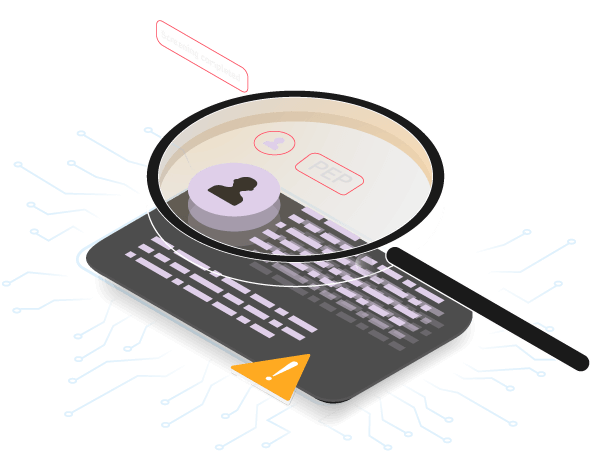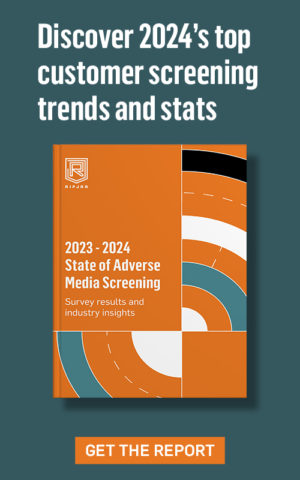Adverse media screening is typically framed as a component of regulatory compliance in jurisdictions around the world, and is necessary for firms seeking to protect themselves against serious financial and criminal penalties. However, while adverse media (or negative news) serves as a valuable early warning system against criminal risks such as money laundering and terrorism financing, it’s worth remembering that it can also help to protect firms against significant reputational damage.
Reputational damage can be just as impactful as the penalties imposed by regulators following compliance violations. In addition to discouraging customers from directly purchasing goods and services, and ceding commercial advantages to competitors, reputational damage can shake markets, and lead to drastic reductions in share value.
From traditional reputational dangers, such as anti-money laundering (AML) and counter-financing of terrorism (CFT) risks, to third party risks, and emerging environmental, social, and governance (ESG) concerns, adverse media screening is a valuable compliance asset. With that in mind, let’s take a closer look at how to implement adverse media screening effectively as a reputation protection mechanism.
The Importance of Customer Screening
Customer screening is crucial to modern AML/CFT strategies since it allows compliance teams to build out accurate customer risk profiles, informed by relevant, current data. Adverse media screening is particularly useful because news stories and other types of online media often reveal compliance risks long before that information is confirmed by government or law enforcement agencies. By implementing an effective screening solution, firms can detect adverse media involving their customers as soon as possible, and capture risk data that other customer due diligence (CDD) processes may have missed.
However, reputational risks often fall outside the scope of traditional regulation-focused AML data sources (such as watchlists), which makes adverse media a valuable supplementary resource for enhancing risk profiles. Unlike other types of AML/CFT risk, reputational risk can be hard to address: news stories can break and develop quickly, and may be shared widely on social media before a firm has had a chance to respond. By screening against adverse media, firms can get ahead of reputational threats, react swiftly to new developments, and make important compliance decisions before damage is inflicted.
Sanctions Screening
Since sanctions lists change constantly, adverse media offers a particular advantage in the swift detection of sanctions compliance risk, which can cause significant reputational damage (should a violation occur). Recent geopolitical events, such as the Russian invasion of Ukraine, demonstrate the speed at which sanctions can evolve, and the need for firms to be agile when determining their risk exposure.


Reputational Risk Categories
To enhance the effectiveness of adverse media screening, it’s useful to categorise relevant data by type. Certain adverse media stories entail both regulatory and reputational risk, so the more accurately a firm can determine the specific threat that a story entails, the more effectively it can deploy a compliance response.
By categorising types of adverse media, it’s possible to identify story characteristics that carry the possibility of reputational damage. For example:
- Human slavery: The exploitation of labour as human slavery. While companies may not engage directly in human slavery, they may be exposed to risk via their supply chain.
- Human trafficking: The illegal movement of people for the purposes of exploitation. Human trafficking is often linked to forced prostitution or slavery.
- Drug trafficking: The illegal movement of drugs for the purposes of sale and distribution.
- Arms dealing: The illegal trade in weapons, including those with indiscriminate effects such as landmines and cluster bombs.
- Bribery and corruption: The illegal use of wealth or power to gain unfair advantage or favourable business outcomes. Bribery is particularly damaging when it involves government officials.
- Environmental damage: Activities that harm the environment, such as drilling and mining, toxic waste disposal, or carbon emissions.
- Discrimination: Companies that discriminate on the grounds of race, gender, sexual orientation, and other protected characteristics.
- Workplace health and safety: The failure to protect employees in the workplace or exposure to poor working conditions. Health and safety issues may be of particular concern in developing nations.
- Animal welfare: Cruelty to animals during transport and trade, or activities that impact on protected species.
- Sanctions: The violation of trade prohibitions with sanctioned nations or persons, including connections to terror groups.
There is significant crossover between different reputational risks, and many of the activities outlined above also entail criminal risk exposure.
Effective Adverse Media Screening
Reputational damage is hard to predict, and varies by the type of activity involved and by the way that a story is reported. However, in order to avoid, or at least mitigate, reputational damage, firms need to see it coming as early as possible. However, identifying specific reputational risks amongst a crowded landscape of adverse media stories, means being able to search huge amounts of data from around the world with speed and accuracy.
Ripjar’s Labyrinth Screening platform is designed to help firms manage their screening obligations, and protect themselves from reputational damage in a complex and constantly changing risk landscape. Powered by cutting edge machine learning technology, Labyrinth Screening is capable of searching thousands of global news sources, sanctions lists and watchlists, in over 20 foreign languages, delivering actionable intelligence in seconds and helping you make important compliance decisions with confidence.









